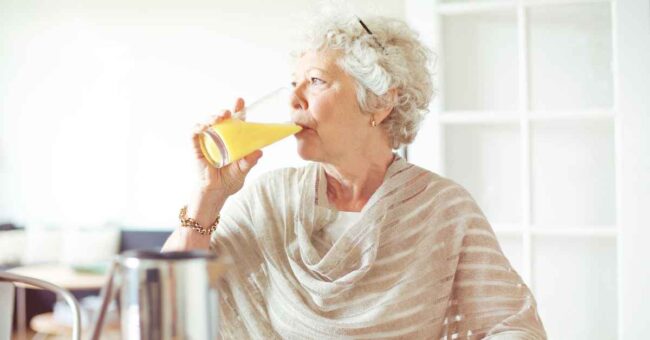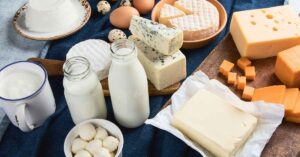Elderly Nutrition
Elderly Nutrition
Last updated August 2022
In this article I will discuss some of the key factors surrounding optimal elderly nutrition as well as addressing some common misnomers and myths surrounding elderly nutrition.
What are nutritional needs of the elderly?
Elderly nutrition needs aren't drastically different from any other age groups nutritional needs but there are some key things to look out for.
I'll discuss these later in this article. In this section I'll focus more on general nutrition guidelines that will be relevant to both the elderly and older adults in general before moving onto much more specific elderly nutrition needs.
Because nutrition is so fundamental to human survival it seems that everyone has an opinion. Nutrition isn't something that only small subsets of society are involved in. Everyone is involved in nutrition. We have to be. As a result, nutrition is a very confusing space.
Thankfully science can debunk the nonsense and tell us the pertinent stuff and that's what I do best.
Let's identify some key nutrition interventions that will play a big role in overall health for the elderly and older adults.
Fruits and vegetables
Not really groundbreaking stuff but it is amazing how many people don't include enough or even any fruit and veg into their diet. Having worked with lots of seniors and older adults within the Wise Fitness Academy there is a distinct pattern of older men not eating vegetables.
Do I really have to stress just how important fruit and vegetables are? They might represent the pinnacle of healthy eating.
They contain key nutrients, vitamins and minerals that you can't obtain from other foods. Variety is always better. Having just broccoli everyday is better than having no vegetables but having broccoli, carrots and spinach for example is better still. Colour is a good way to easily measure intake.
Eat veg that is dark green right through to veg that is yellow and red.
For elderly people and seniors who struggle to cook, there are other ways of getting vegetables into your diet such as smoothies.
Fibre
Fibre is often underrated in terms of it's importance but more recently it has had a resurgence and is now more widely recognised as a fundamental part of a healthy diet. Although fibre can be found in a lot of food sources, the general population are probably not hitting the required 30 grams per day for optimal health.
More fruit and veg (which contain lots of fibre) would help to reverse this. Fibre is also strongly associated with reduced heart disease and all cancers (as this meta-analysis shows) which are 2 ailments that are more prevalent in the elderly and older adults. Whole grains, beans, nuts and legumes are also good sources of fibre.
Dairy
Dairy has garnered a bit a negative reputation in recent years which is problematic because it's a food group that is largely very nutritious. It can be especially helpful for older adults and the elderly for a few reasons.
Firstly it's a great source of high quality protein which is of high importance to seniors to help prevent age related muscle loss (sarcopenia). The totality of evidence shows a neutral or even modest reductions in cardiovascular disease risk which of course is prevalent in the elderly.
It's important to remember that dairy is a large food group and whilst certain products such as butter does appear to significantly increase biomarkers such as cholesterol, other products such as milk, cheeses and yogurt appear to have a positive impact on cardiovascular disease risk. You should avoid trans fats completely which can sometimes be found in margarine.
Fresh, wholegrain food Vs highly processed food
As a general rule of thumb our diets should be made up of MOSTLY fresh, wholegrain foods such as lean meats, fruits and vegetables, nuts, beans, legumes, dairy and fibre rich foods.
We should generally try and limit highly processed, Calorie dense and nutrient deficient foods such as chocolate, sweets, cakes, takeaways etc. Elderly nutrition would be in a far better place if these broad guidelines were followed by all.
What foods should the elderly avoid?
There might be some foods that are best avoided for optimal elderly nutrition or at least eaten sparingly. I'm not a huge advocate of totally eliminating certain foods that can otherwise be a part of an overall healthy diet pattern.
There are well known movements that are often endorsed by celebrities such as eliminating sugar from the diet or even going as far to suggest eliminating carbs.
These types of radical interventions are not very practical and mostly totally unnecessary. Older adults and the elderly can enjoy a range of foods as long as the bulk of the diet is made up from whole, nutrient dense foods as suggested earlier in this article.
For the management of often age related issues such as high cholesterol then avoiding foods with lot's of saturated fat is prudent for older adults and the elderly but this is also advice I would give to the general population.
No food is out of bounds unless you're allergic but exercise good judgement about your overall diet pattern.
How many calories do elderly people need per day?
Calorie intake ultimately determines bodyweight and in the last few decades there has been an sharp increase in the amount of elderly people and older adults being over weight. It presents significant issues as so many age related chronic diseases are not only brought on due to excess body weight but are also significantly exacerbated by it.
There is a very minor metabolic slowing with age meaning fewer Calories are required. This may make older adults more prone to weight gain but it's certainly by no means a forgone conclusion that older adult and the elderly will gain weight.
In fact at the other end of the spectrum we often see much older adults who suffer with frailty struggling to eat enough. This is likely due to a combination of reasons including loss of appetite, inability to stand for long periods of time and cook proper meals and denture issues.
You can workout your likely daily Calorie requirements using this online Calorie calculator. It's really only useful to know your Calorie needs if you're going to spend some time tracking your Calorie intake. This can be really helpful for some people but not so much for others.
This video provides more information on the body weight planner online calculator.
Ultimately you don't need to track Calories to successfully manipulate your weight.
Weight management is something we help a lot of our clients with in the Wise Fitness Academy and you can learn a lot more about weight loss by reading this comprehensive fat loss article .
What are three common nutrition related problems in the elderly?
The older generation do face some exclusive challenges when it comes to elderly nutrition.
Protein intake
The elderly and older adults have a blunted response to protein in relation to muscle protein synthesis. Our bodies require a certain amount of protein in order for muscle protein synthesis to occur. In older adults, that required amount increases because the body is less sensitive to the stimulus that protein provides.
Older adults and the elderly should make a significant effort to consume at least 25 -30 grams of protein 3-5 times per day to ensure optimal muscle protein synthesis.
A really cheap and easy way to get good quality protein into the diet is to drink protein shakes. You can order a good quality protein from Bulk Powders.
You can learn more about protein intake for older adults here
Vitamin D
Sufficient Vitamin D has been associated with a range of health benefits from helping to prevent cancer and other chronic diseases as well day to day energy levels.
Vitamin D is mostly absorbed via sunlight which can cause deficiency issues for institutionalised older adults in care homes or even those who venture outdoors less due to even slight mobility issues. Is is highly advised that general population supplement vitamin D especially during winter months and this recommendation should be stressed to the elderly. With appropriate education surrounding vitamin D supplementation elderly nutrition would be a much better place.
The NHS recommends between 400-4000 IU's per day may required depending on your current levels. You'll need a blood test to determine your current vitamin D status. The NHS recommends
Vitamins and minerals
Due to a potential reduction in absorption and assimilation of general essential nutrients which can occur from the ageing process, older adults and the elderly should pay closer attention to the amount of nutrient dense foods they are including in their diet and monitor for deficiencies with use of blood tests. Elderly nutrition should be a little more bespoke when compared to the younger generation.
Written by Ollie - The head nutritionist and personal trainer at the Wise Fitness Academy







